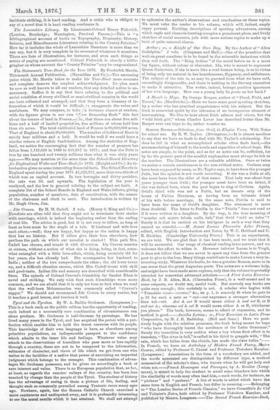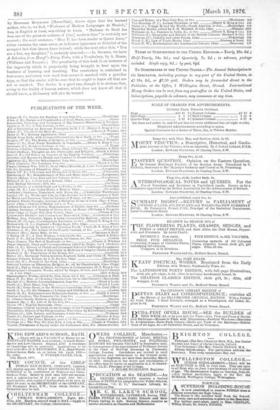BeoKs.—Selections from Ovid, in Elegiac Verse, With Notes for school
use. By R. W. Taylor. (Rivingtons.)—It is almost needless to say that we have no fault to find with Mr. Taylor's scholarship. Nor does ho fail in what an accomplished scholar often finds hard,—the accommodating of himself to the needs and capacities of school-boys. His notes are simple, to the point, and as far as notes can be, sufficient, for by far the greater part of the needful explanation must always be loft to the teacher. The illustrations are a valuable addition. Once or twice we notice a certain carelessness in the non-critical notes. Oorinna may have been supposed by some, as Mr. Taylor says, to have been the younger Julia, but the opinion is not worth recording. If she was a Julia at all, she must have been the elder of that name. That lady was about four years younger than Ovid ; the younger must have been an infant, if she was indeed born, when the poet began to sing of Corinna. Again, Ovid's third wife was not a Fabia, but an inmate only of the house of Fabius Maximus, as having been an intimate friend of his wife before marriage. In the same note, Porilla is said to have been the name of Ovid's daughter. The statement is more than doubtfal. The letter to Porilla in the " Tristia " does not read as if it were written to a daughter. By the way, is the true moaning of "nomine sub nostro inhale nulls fuit," that Ovid "told no tales "? Surely it is that he carried on his intrigues in such a way that they caused no scandal.---M. Antral Lucani Pharserlim Liber Primus, edited, with English Introduction and Notes, by W. C. Heitland and C. E. Haskins. (Cambridge University Press.) This is an experiment, we are told. We are glad that it has been made, and we trust that it will be successful. Our range of classical reading is too narrow, and we welcome the effort to widen it. However inferior Lucan is to Virgil, it does not follow that we are never to spare any time from the greater poet to give to the less. Many things contribute to make Lucan avery in- teresting study. Whatever his faults, ho was a genuine Roman, more so in one sense than the great Augustan poets. The notes are a welcome help, and might have been made more copious, only that the volume is probably intended for somewhat advanced scholars.—A First Latin Exercise- Book, by J. B. Allen, M.A. (Clarendon Press), is a wall-meant and in some respects, we doubt not, useful book. But scarcely any books are quite easy enough ; this certainly is not. A scholar who begins with "Translate rocat—vocatur," &c., on p. I, is scarcely fit when he gets to p. 31 for such a note as "ant—ant expresses a stronger alternative than vel—vel. Ant A out B would mean either A and not B, or B and not A; whereas vel A eel B would mean either A or B, whichever you please." The book, however, seems to admit of expansion, and its method is good.—Ausilia Latina ; or, First Exercises in Latin Prose
Composition, by M. J. B. Baddeley. (Bell and Sons.) Here we posi- tively begin with the relative pronouns, the book being meant for boys "who have thoroughly learnt the accidence of the • Latin Grammar.' Surely the transition is very sudden when a boy whose first effort is to translate," The river is full," is called in his third to grapple with, "The rain, which has fallen from the clouds, has made the river fuller."— In French, we have an Anthology of Modern French Poetry, itninr Course, edited by Professor C. Cassel and Professor Theodore Karcher.
(Longman') Annotations in the form of a vocabulary are added, and the words annotated are distinguished by different type, a method economical of the scholar's time, who knows when he will got help and when not.—French Homonyms and Paronyms, by A. Roulior (Long-
mans), is meant to help the student to avoid some blunders into which the similarity of words may often lead him,—such words, for instance, as " pechour " and " pecheur." A list of words is added which have the same form in English and French, but differ in meaning.—Belonging to "The London Series of French Classics," we have Corneille's Le Cid and Voltaire's Zaire, both edited by Professor Theodore Karcher, and published by Messrs. Longman.—The Second French Exercise-Book, has, in English at least, something to learn. Madame de Stag has been one of the greatest authors of [the] modern thne" is certainly not correct ; the next sentence, "Miss P. has been reader to Queen Anne," either contains the same error, or indicates ignorance or diebelief of the accepted fact that Queen Anne is dead ; while the next after this, "You are a liar, my daughter," is certainly unusual-In German, we have A Selection from Ilauff's Fairy Tales, with a Vocabulary, by A. Hoare, (Williams and Norgate.) The peculiarity of this book is an instance of the ingenuity which is perpetually being brought to bear upon the business of learning and teaching. The vocabulary is contained in foot-notes, and every now word that occurs is marked with a peculiar type, so that the reader will be sure that he ought to know all that are not so marked. The device is a good one, though it is obvious that, owing to the frailty of human nature, which does not know all that it should know, a dictionary will also be wanted.



































 Previous page
Previous page